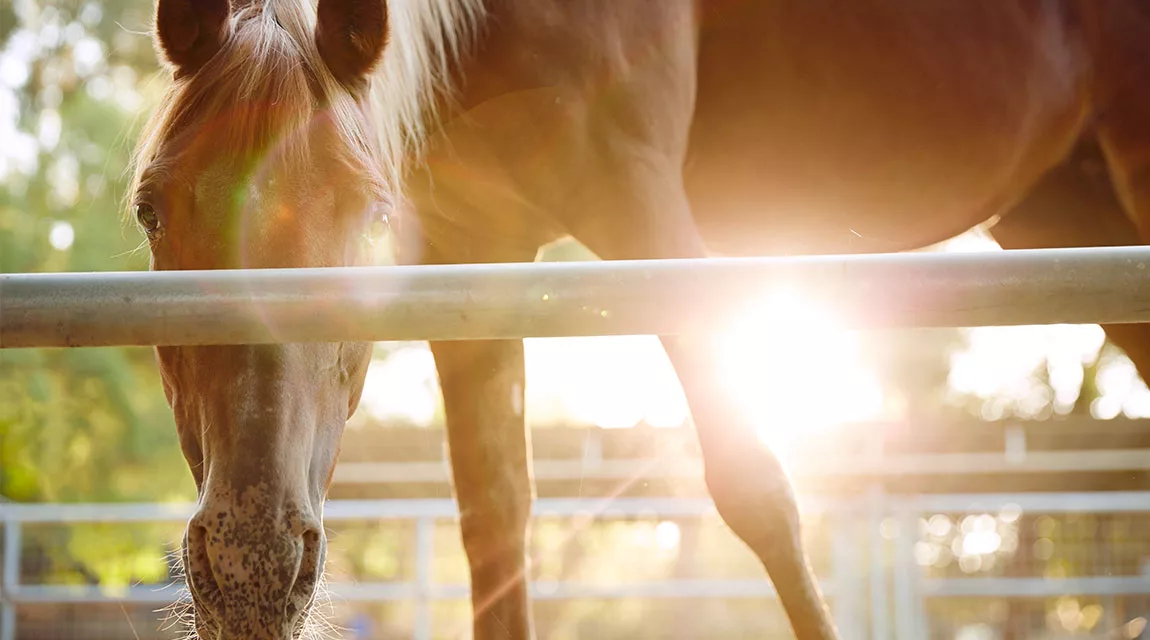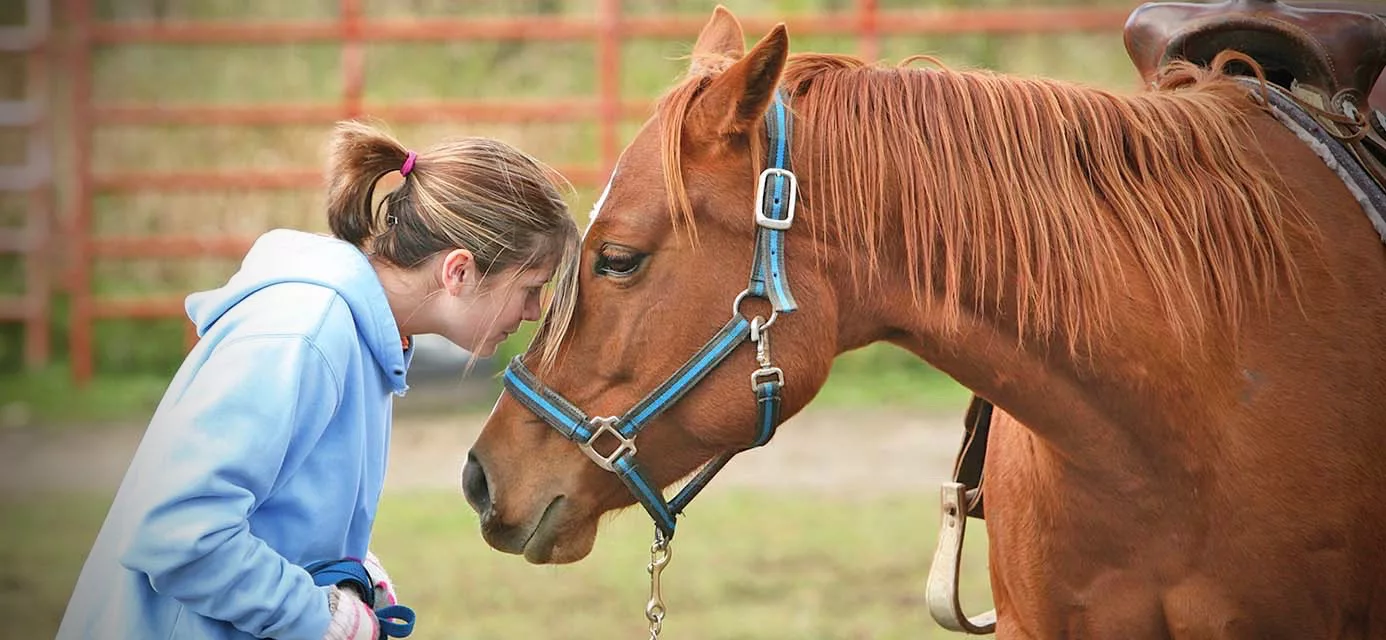Equine Therapy, also known as Equine-Assisted Therapy, is an innovative, experiential approach that actively involves horses in mental health treatment. A powerful, evidence-based modality, Equine-Assisted Therapy is also referred to as equine therapy, horse therapy, therapeutic riding, and equestrian therapy.
Through horse-based activities, teens gain confidence, build trust, and form healthier boundaries. Moreover, learning how to work with and take care of a horse, with the guidance of an equine therapist, helps clients practice empathy and develop authentic connections.
This form of therapy is particularly effective for teens because it allows them to address emotions and issues through direct experience and nonverbal communication. Consequently, it can be especially helpful for teens who are resistant to talk therapy.
History of Equine Therapy
Today’s Equine-Assisted Therapy programs evolved from thousands of years of therapeutic methods involving horses. The earliest recorded mention of equine therapy is in the writings of Hippocrates, a Greek physician born in 460 BCE. He wrote about hippotherapy, derived from “hippos,” the Greek word for horse.
In the 19th century, German physicians advised horseback riding to reduce attacks of hypochondria and hysteria. Subsequently, Europeans continued to promote and standardize therapeutic riding methods to reduce physical ailments and promote psychological wellness. Since the 1990s, inpatient rehabs and mental health programs have instituted horse programs for youth as a part of the therapeutic process.
The Equine Assisted Growth and Learning Association (Eagala) was founded in 1999. It was one of the first organizations to develop professional standards for incorporating horses into mental health treatment.

How Does Equine-Assisted Therapy Work?
In Equine-Assisted Therapy sessions, teens learn how to accept themselves and others by working with horses and with credentialed therapists. By caring for and connecting with horses, they experience a wide range of equine therapy benefits.
Research shows that Equine-Assisted Therapy is effective for treating adolescents experiencing depression, anxiety, and/or trauma-related symptoms, as well as ADHD, autism, dissociative disorders, and other mental health diagnoses. In one representative study, adolescents showed increased confidence, self-esteem, assertiveness, emotional regulation, and resourcefulness as a result of this form of therapy. In some cases, just a few sessions of equine therapy can produce improvement.
Furthermore, equine therapy reduces anxiety and depression through physiological changes. Studies show that animal-assisted therapy reduces cortisol, the stress hormone. In addition, spending time with animals lowers blood pressure. And it increases the release of oxytocin, a natural chemical that promotes feelings of positivity and connection.
The Horse-Human Relationship in Equine-Assisted Therapy
Horses have a unique sensitivity to people’s feelings. In addition, horses react to subtle changes in their environment. Therefore, they can sense a teen’s emotional state, including states of depression or anxiety.
Thus, the horse acts as a sort of biofeedback machine for adolescents, responding to and reflecting their emotions. Moreover, horses don’t judge teens based on their appearance or their diagnoses. As a result, teens feel accepted and unconditionally loved. The horses at Newport Academy are an important part of the treatment team and receive the best of care.

Types of Equine Therapy
There are several types of Equine-Assisted Therapy, each with different goals:
- Equine-Assisted Psychotherapy (EAP): In EAP sessions, licensed mental healthcare providers partner with credentialed equine professionals to help clients work toward psychotherapy treatment goals.
- Equine-Assisted Learning Therapy (EAL): This type of therapy focuses on helping individuals develop essential life skills, such as communication, trust, respect, self-awareness, and honesty.
- Hippotherapy: In contemporary usage, hippotherapy refers to methods of occupational therapy, physical therapy, and speech therapy using horses.
The Benefits of Equine-Assisted Therapy
Equine-Assisted Therapy supports teens on multiple levels. Studies show that equine therapy benefits include the following:
Greater Confidence and Self-Esteem
In therapy, teens learn to master the skills of working with horses. As a result, they have more confidence in their ability to take on new projects. Moreover, their motivation for taking on other recovery-related challenges increases.
Better Communication Skills
Equine-Assisted Therapy teaches adolescents the importance of nonverbal communication. The horse’s reaction to their mood helps them see how their emotions and nonverbal cues affect those around them.
Improved Self-Regulation
Because horses respond immediately to their actions, teens learn to control and modulate their behavior. Hence, they develop self-awareness and self-control.
Sense of Trust
For teens who have experienced trauma, abuse, or abandonment, learning to trust the horse helps heal these wounds.
More Realistic Self-Image
Interacting with horses gives teens a more realistic view of themselves in relationship to a much larger creature. Therefore, equine therapy can be helpful for teens diagnosed with eating disorders.
Ability to Focus on Others
The act of grooming and caring for a horse helps teens focus on something outside their own struggles. Their attention is directed on the present moment and others’ needs rather than unhelpful rumination.
Stronger Social Skills
A positive relationship with a horse builds a teenager’s social skills. Hence, they are able to form and strengthen relationships with people.
Feelings of Connection
Teens struggling with mental health or substance abuse often feel alone and isolated. A horse’s unconditional acceptance helps them feel a sense of connection with other living beings and with the larger world. Hence, equine therapy supports the development of positive relationships with oneself, other people, and our animal friends.
Sources:
Clinical Child Psych and Psych. 22(1):16–33.
Front Psychol. 2012 July.
Open Compl Med J. 2009 Apr.






